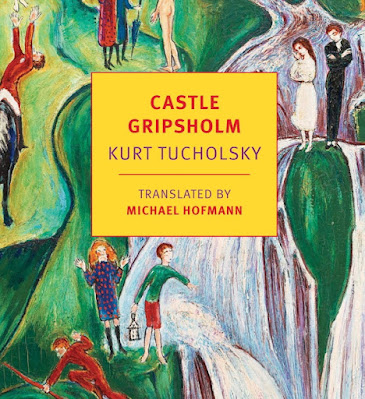Castle Gripsholm - 1931- by Kurt Tucholsky- 244 Pages- translated from the German by Michael Hofmann -2019
KURT TUCHOLSKY (1890–1935) was born in Berlin to a middle-class Jewish family. He received a law degree from the University of Jena in 1915 and was conscripted to fight in World War I not long after
. A notably poor soldier, his aphorism likening soldiers to murderers became a pacifist rallying cry. Tucholsky began his journalism career while still a student, and he found success writing in a range of forms, including the feuilleton, criticism, satire, poetry, and lyrics for cabarets. Under both his name and various pseudonyms, his work frequently appeared in the leftist intellectual organ Die Weltbühne Tucholsky’s collected writings amount to thousands of pages and include a play, Christopher Columbus (1932); an illustrated book, Deutschland, Deutschland über alles (1929); and two works of fiction, Rheinsberg (1912) and Castle Gripsholm (1931). He was married twice, to Else Weil from 1920 to 1924 and to Mary Gerold in 1924. In 1933, his last piece for Die Weltbühne appeared in January; by August his German citizenship had been annulled and his books burned en masse. The Nazis had denounced him as “one of the most wicked of literary pornographers.”
He divorced Mary to distance her from Nazi persecution and lived in exile in Sweden on short-term visas under threat of deportation, where he died from an overdose of sleeping pills. There are two annual literary awards given in his name: the Swedish PEN Tucholsky Prize and Germany’s Kurt Tucholsky Prize.
Castle Gripsholm is Tucholsky’s only novel, his longest single piece of work of any kind. As a critic, he had a very high regard for the form, and so, despite his modesty in not claiming the tag for himself, tribute should be paid to the skill of this one (which has sold three-quarters of a million copies). More than anything else, it is a beautifully plausible version of what it pretends to be: ‘a summer story’ – the plainest and clearest and liveliest of first-person writing – full of fresh air, sunshine, trees, companionableness and friendly bickering – sweet oblivion. But, in the light of its author’s other preoccupations, commitments and achievements, and of the date itself – two years later he would be stripped of his citizenship and his books would be burned – can this withdrawal, this holiday, this compliance with his ‘publisher’s’ wishes, can it be real? It is real, though the reality is wishful. That the sales of his books really did matter more than what he was trying to achieve in writing them. That it would be possible to turn away from politics, and to forget what was happening, in some serene privacy. That the struggle in Germany and for Germany could take place on some manageably small and symbolic level, like the struggle for Ada. That his privacy would indeed be serene . . . Castle Gripsholm is a book by a man who was never a father himself, and in whose life there were many women.
Available in The New York City Public Library







3 comments:
Interesting review and background info on the author. I actually visited the Castle of Gripsholm this summer. It is a wonderful place. Having said this, I think I have to read this novel.
I had never heard of this novel: I can understand why it would be such a rewarding (and timely) read.
Ah, Kurt Tucholsky has written some great novels, and I have no idea why I haven't reviewed this one, will have to do so one day.
But I have written about Rheinsberg, and that is also a lovely story:
https://derbuecherwurm.blogspot.com/2022/06/tucholsky-kurt-rheinsberg.html
Post a Comment